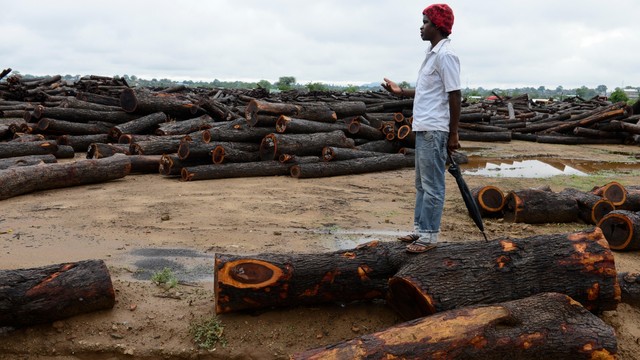Mist clears on China in African forests
Improving Chinese investment in African forest land use
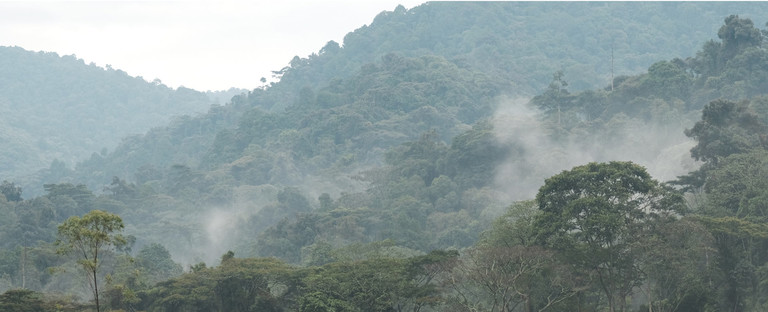
Look closely into an African forest and you'll see China's influence
Chinese investment and trade is having a huge impact on African forests. In some cases, this has provided steady jobs and incomes for local communities and contributed towards decent forest management. But at other times forests have suffered and people's lives have changed for the worse.
Foreign investment from other countries is having these effects too, but the vast and increasing scale of activity by Chinese companies in Africa warrants special attention. China buys more than 75 per cent of Africa's timber exports and is now the top importer of timber from several African nations. Chinese investments in agribusiness, mining and infrastructure in Africa's forest and woodland areas are growing too.
Julian Barungi, Advocates Coalition for Development and Environment (ACODE)Chinese investments have reached a scale where we can no longer ignore China in Africa
The current growth in Chinese investments in African land use can bring great opportunities for policymakers to ensure that benefits reach local communities and boost the sustainability of African forestry.
Yet there is immense misunderstanding about the nature of these investments. By producing better evidence on the nature of these engagements, linking actors from both sides, and identifying policy and research gaps, IIED and its partners are trying to improve decision-making on these issues.
Forest paths that don't meet
The infographics here provide a visual account of the scale and trends in recent years of Chinese investment in Africa's forestry sector. They also show how China is a big player in Africa's infrastructure building.
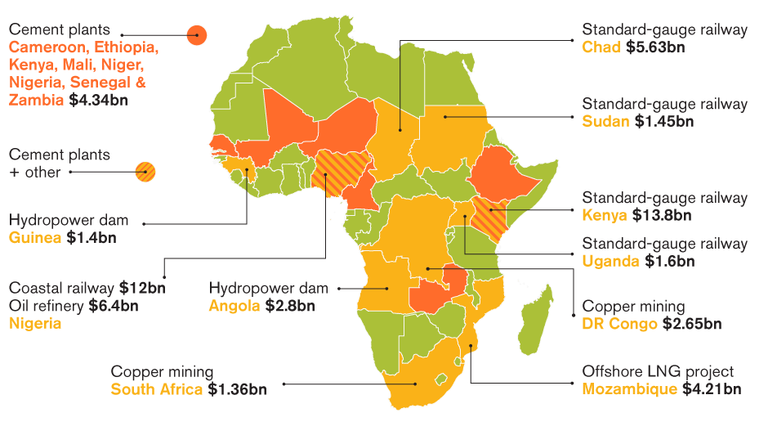
Major African infrastructure projects linked to China by financing, construction or investment. See the complete set of infographics:
In the mining sector, the investment grew from US$15 billion to $155 billion between 2010 and 2011. In the forestry sector, the companies tend to present a short- to medium-term outlook of their investment in the country of operation. This is because they tend to be small and medium-size enterprises – 80 per cent of the Chinese companies that have invested in Africa's forestry sector since 2007 have less than $10 million in registered capital.
China's investment and trade in Africa's natural resource sectors have significant implications for Africa's forests and the vital role they play in contributing to local livelihoods, biodiversity conservation, climate change mitigation and the global timber trade.
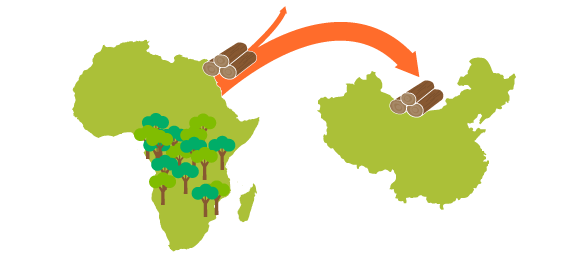 In 2009, 78% of Africa's timber exports went to China
In 2009, 78% of Africa's timber exports went to China
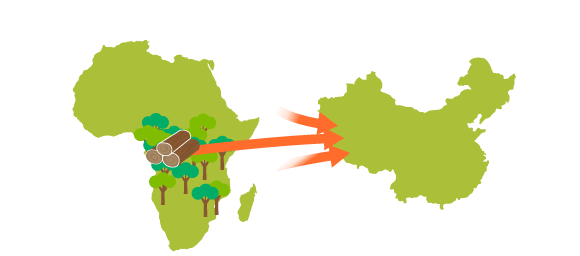 2012: More than a third of African timber imported by China came from Central Africa
2012: More than a third of African timber imported by China came from Central Africa
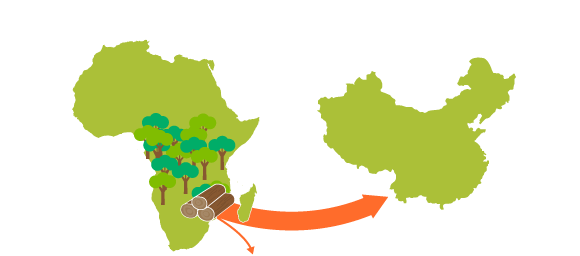 2013: Mozambique exported ~90% of its timber to China
2013: Mozambique exported ~90% of its timber to China
Key players in China and Africa – in government, in NGOs, in academia, and in the companies themselves – that can best help chart a sustainable course for these investments are poorly linked.
In particular, African stakeholders are unsure how to approach and engage with the Chinese business actors in their country and with the Chinese government players and civil society organisations that can help them promote better investments on the ground.
Making the China-Africa forest connection
To bridge the gap between key players in Africa and China, the China-Africa Forest Governance Learning Platform was launched in 2013. For IIED this had emerged as a pressing need from its work with the Forest Governance Learning Group – groups of practitioners in governance from 10 African and Asian countries – over a decade.
Since its inception, the platform has brought together forest governance players from China and eight African countries, including heads of governmental forest departments, prominent researchers, and practitioners from international organisations.
Three major events have been held since 2013, and the platform is now recognised as a key multi-stakeholder forum to strengthen mutual understanding, partnerships and joint actions on forest governance between China and Africa.
"Previously, Chinese investors seemed so far away, no one could get close to them," says Julian Barungi, a researcher at ACODE. She describes how the platform supports ongoing efforts in Uganda to link up stakeholders: "But with the emergence of the China-Africa Forest Governance Learning Platform, we've been able to get Chinese investors on the one hand, Ugandan policymakers, Ugandan civil society, foresters, agriculturalists… to come together and dialogue on issues."
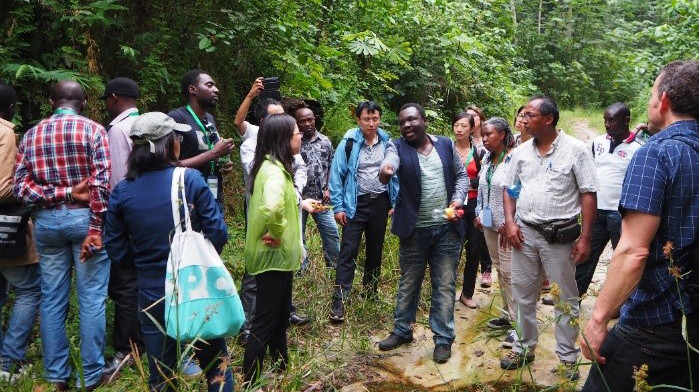
Patrice Kamkuimo (formerly from the Centre for Environment and Development, Cameroon) explains the impacts on forest communities living near the soon to be inaugurated Deep Sea Port in Kribi, which is set to accelerate investment and trade in the country and region (Photo: Khanh Tran-Thanh, IIED)
For Dr Xu Bin, from the Research Institute of Forestry Policy and Information (RIFPI), Chinese Academy of Forestry (CAF), work in Cameroon with the platform led to a deeper understanding of the realities of African forest communities.
He says: "A lot of people rely on the forests to survive. In contrast, often in China, forests offer more complementary services. Also, African forest resources are much better than China's, including its biological diversity, the protection and uses of special trees. They are assets for all humanity, we need to manage and protect them together."
The platform in 2016: from dialogue to joint solutions
In October 2016, a third international learning event took place in Beijing, China, hosted by IIED and its partners, the Research Institute of Forestry Policy and Information (RIFPI) of the Chinese Academy of Forestry (CAF), the Centre for International Forest Products Trade of the State Forestry Administration, the EFI EU FLEGT Facility, the Global Environmental Institute and the World Wide Fund for Nature (WWF) China. This followed previous events in Cameroon and China and a range of smaller international and country-based dialogues.
More than 120 participants – prominent individuals from key government departments, civil society and private sector organisations – from China, Africa and the international community came together to discuss how China and Africa can collaborate better to sustain Africa's forests.
Renato Timana, National Directorate of Land and Forest, MozambiqueAt the China-Africa platform event [in Beijing in 2013] I realised how we can work together to get a better grip of the forest sector. When I came back to Mozambique, I started to work with some NGOs to organise a meeting of all the Chinese companies to go through laws and guidelines
Read more about the Beijing platform event and view a newsletter.
Such events provide both a seedbed for new ideas and a means to spread initiatives to improve Chinese investment in African land use.
Julian Barungi, from Uganda, and Dr Xu Bin, from China, attended the Cameroon (2015) and Beijing (2016) events. Here they share their observations on how the platform has facilitated dialogue among key players in their countries and how it has contributed to policymakers' thinking on these issues.
Since 2013, the platform and the initiatives it has spawned – including the China-Africa Forest Governance Project led by IIED – have made some useful gains:
- Better evidence base: Diagnostics have been developed in Cameroon, DRC, Uganda, Mozambique and China – providing rigorous evidence of the impact of China-linked investments in land use and trade on forests and livelihoods. Studies of timber flow from Africa to China, and of potential incentives for improved practices by companies and investors, have also been carried out.
- Vibrant dialogue with Chinese companies and traders: A network of Chinese enterprises on a Chinese social media platform has been developed – with regular newsletters sent on issues of policy changes, sustainable practices and key sector trends – and through face-to-face dialogue in DRC, Cameroon, Mozambique and China. It draws attention to laws and policies and is steadily ramping up engagement on legality and sustainability issues. In China, some 48 companies have signed up to a green procurement initiative and platform partners are developing it further to explore procurement of green timber from Africa.
The platform has definitely contributed to the thinking on Chinese timber policymaking – what are the issues, what's needed more – in the last few years
- Dr Chen Shaozhi, RIFPI, CAF (China)
- Mechanism for collective engagement with Chinese companies in Africa: Following concerted awareness and capacity-building work, a Chinese timber traders' association was launched in Cameroon in 2016, with more than 20 members from Cameroon and the surrounding Congo Basin countries. The association focuses on legal compliance and allows partners to engage directly with a group of companies together.
- Training with Chinese banks on sustainable forestry and green credit: WWF China, a partner on the platform, has been working with 12 Chinese banks and the China Banking Regulatory Commission on sustainable forestry and the potential for green credit. The aim is to move towards a green credit management system for international projects based on assessments of environmental and social risks, and to improve the capacity of both financial institutions and forestry companies to conduct complex evaluations and monitoring work.
- Direct engagement in policy reform: In Mozambique, platform partners are actively participating in forest law reform. There is also great potential for them to contribute to the phasing out of the currently unsustainable simple license regime, potentially introduce a new concession format for communities, and develop a new national fund that receives forest revenues and reinvests them in line with sustainable forestry.
- High-level access to government: Platform participants are engaging vigorously with high-level policymakers and parliamentarians, as well as Chinese embassies, in Uganda and Cameroon. In China, work continues with the Customs department, Ministry of Environmental Protection and State Forestry Administration on the sustainability and investment risks associated with Chinese investment in Africa's land-use sectors, including through the EU-China Bilateral Coordination Mechanism on Forest Law Enforcement and Governance established in 2009.
Platform partners have contributed to the Forum on Collaboration between Africa and China (FOCAC), and created access to improve further engagement with this key trans-national policy process.
African forests are calling – for accountable policy and responsible practice
A strong policy agenda emerged from the platform meeting in Beijing this year. African participants in particular pointed to the urgency of ensuring forests are used wisely, and the potentially attractive rewards of responsible Chinese investment in Africa – which represents an alternative model for stimulating development than the $1 trillion of foreign aid estimated to have been spent in Africa over the last 50 years.
Here are some of the key actions for Chinese government agencies and companies, and for African governments and their supporters:
Chinese government – invest in policy, guidance, financial frameworks and organisation
- Help improve legal frameworks: issue a timber legality decree in the short term and work towards a formal law in the long term to help ensure timber flows to China are legal and sustainable.
- Boost verification: integrate and expand existing Voluntary Partnership Agreements between timber-producing countries and the European Union with the emerging Chinese Timber Legality Verification System.
- Improve monitoring: develop monitoring mechanisms to ensure that Chinese companies follow regulations and implement policies developed by the Chinese government for companies investing overseas. To date the Chinese government has adopted 33 key policies and guidelines to promote sustainable development through its overseas investments, but research shows that awareness of these documents is low among Chinese businesses operating in Africa.
 Awareness of Chinese government overseas business policies and guidelines among 60 respondents based in Africa
Awareness of Chinese government overseas business policies and guidelines among 60 respondents based in Africa
- Green financing: green finance and green procurement for forests both need a concerted push to develop them from their promising beginnings.
- Invest in skills and organisation: improve engagement, efficiency and effectiveness in the public and private sector in Africa in particular. Chinese development cooperation could play a key role here.
- Expand the role of Chinese NGOs: the Chinese government should put in place policies and financial incentives that would promote Chinese NGOs to 'go out' to conduct research and implement projects overseas. These organisations could serve as a bridge between Chinese companies and African civil society to foster collaboration to promote sustainable business practice
Chinese companies – open up to community engagement and accountability
- Improve transparency of investment plans: recognise communities' complex land and resource rights and engage in constructive dialogue with locals communities and NGOs.
-
Wang Lei, senior project officer at WWF China, believes constructive dialogue between NGOs and Chinese companies can lead to sustainable Chinese investment and trade in Africa.
- Understand the forest resource and act on this knowledge: plant more trees, and recognise that community forest management is the future.
- Invest in value addition and secondary processing locally: this creates jobs, promotes more efficient use of resources and contributes to the local economy. Some Chinese companies are already leading in this approach and shared their lessons at the Beijing platform.
- Guidelines help: ensure that guidelines prepared by the Chinese government with input from NGOs are more widely followed. Chinese companies should promote greater disclosure and take steps towards greater accountability.
- Work with government: collaborate with African hosts to improve efficiency and reduce transport costs.
- Work with communities: NGOs and development organisations can facilitate community engagement. Working with these organisations to promote legal timber also increases social license through improved local livelihoods and poverty alleviation.
African governments and their supporters – foster better policy and sustainable processing
- Improve policy measures: impose log export bans and other practical measures to promote sustainable and responsible value-added processing in the forest sector through:
- favourable taxation and institutional climate
- improved infrastructure in terms of energy, transport, and communications
- integrated value-added forest processing in wider country strategies
- promoting SMEs and the integration of the informal sector
- banning the harvesting of certain over-exploited timber species
- using secondary species more and diversify products, and
- binding all the above measures to requirements for good forest resource management.
- Improve port inspection capacity: employ properly trained personnel with sufficient knowledge to prevent the export of prohibited timber species, as well as those that are not classified as timber species.
- Avoid dangers of exclusivity: take steps to ensure that any preferential treatment designed to reward companies for pioneering sustainable forestry does not backfire by encouraging the rest to become less responsible and more unaccountable – a situation where the 'best becomes the enemy of good'.
- Create forest product parks: initiatives to promote value-added processing should focus on 'sustainable forest product development parks', building on experience from countries including Ghana, Gabon and China to create similar projects elsewhere (such as in Mozambique).
- Invest in skills and organisation: African governments – and their Chinese counterparts – should focus on building their capacity to better manage the commercial logging sector.
Looking ahead, the platform is poised to deepen its engagement with a growing network of interlocutors and to gain further support as a key mechanism to take China-Africa forest partnerships forward.
Participants hope it will be able to: work with the association of Chinese companies in Africa to help small and medium-sized enterprises to improve their practices and links to procurement initiatives in China; continue to engage larger companies supplying the timber trade to China on legality and sustainability; develop practical arrangements for Chinese companies to demonstrate increased social and environmental responsibility in agribusiness, mining and infrastructure projects in Africa; accelerate work with African government agencies on policy reforms; support initiatives by the Chinese government for improved guidance for Chinese companies; and promote due diligence, green procurement and forest sector support through foreign aid.
Mists of uncertainty and misunderstanding have shrouded China's role in African forests in recent years. These are beginning to clear and, thanks to initiatives such as the China-Africa Forest Governance Learning Platform, the prospects for true China-Africa forest partnerships look more promising than ever.
On a similar topic
China has become African’s largest trading partner, yet there is poor evidence on the policy tools that underpin China’s economic diplomacy in Africa and how they affect the conduct of Chinese companies. Read our research report exploring the content of bilateral investment treaties signed between China and several sub-Saharan African states, and whether they are achieving the goal of promoting foreign investment.

This research was funded by UK aid from the UK Government, however the views expressed do not necessarily reflect the views of the UK government.


